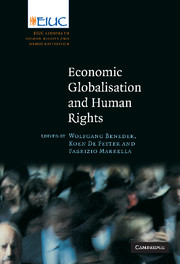Book contents
- Frontmatter
- Contents
- List of contributors
- Series editors' preface
- Preface
- List of abbreviations
- Introduction
- PART I Inter-disciplinary Perspectives on Human Rights and Economic Globalisation
- Economic Globalisation, Globalist Stories of the State, and Human Rights
- Towards a Theory of Global Ethics in Support of Human Rights
- Localising Human Rights
- Globalisation and Social Rights
- PART II The Relevance of Human Rights for International Economic Organisations
- PART III International Corporate Accountability
- Index
Economic Globalisation, Globalist Stories of the State, and Human Rights
Published online by Cambridge University Press: 09 July 2009
- Frontmatter
- Contents
- List of contributors
- Series editors' preface
- Preface
- List of abbreviations
- Introduction
- PART I Inter-disciplinary Perspectives on Human Rights and Economic Globalisation
- Economic Globalisation, Globalist Stories of the State, and Human Rights
- Towards a Theory of Global Ethics in Support of Human Rights
- Localising Human Rights
- Globalisation and Social Rights
- PART II The Relevance of Human Rights for International Economic Organisations
- PART III International Corporate Accountability
- Index
Summary
Introduction
In the early years of the state/globalisation debates it had become almost a fashion in certain intellectual circles to speak of the demise of the state as a response to the pressures of globalisation. Government policy papers and newspaper reports were (and sometimes still are) full of accounts of the state/globalisation relationship. It was contended that globalisation of culture, communication, and, especially, capital had led to a point where the state was no longer capable of steering its own course. It was argued that irreversible historical changes had occurred, which would have a major impact on the nature and capabilities of the state, as it has been known since the eighteenth century. The state as an institutional form was helpless when faced with the processes of economic globalisation, and therefore also redundant. New forms of global governance that transcended traditional division of the world into state-units were being envisaged.
Such theories provoked an explosion of academic literature, contending that they were wrong in many different ways and on numerous counts, and also of literature commenting on the allegedly competing relationship between the state and globalisation as a false, artificial opposition. Weiss systematically identified four hypotheses about the relationship between state and globalisation, the first one belonging to the first wave of literature, and the rest to the second:
strong globalisation leads to state power erosion;
- Type
- Chapter
- Information
- Economic Globalisation and Human RightsEIUC Studies on Human Rights and Democratization, pp. 17 - 38Publisher: Cambridge University PressPrint publication year: 2007
- 1
- Cited by

